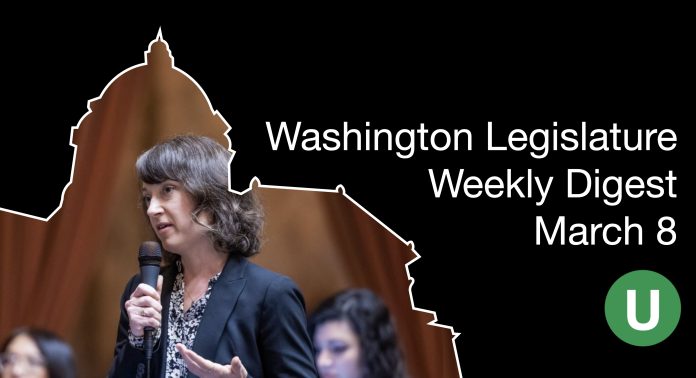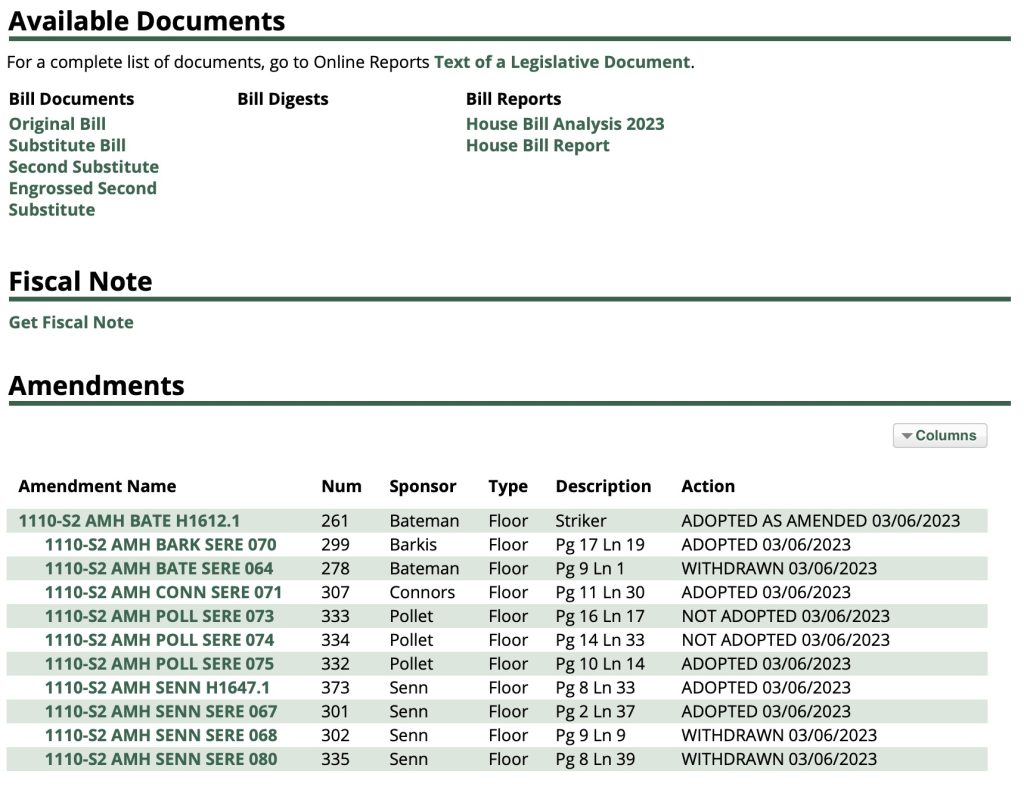
WALeg Wednesday on a Thursday follows the bills that got to swap chambers as the music goes on for some and others fail for the year.
The winnowing continues as the deadline for legislation to escape its house of origin passed at 5pm on Wednesday evening. Of the bills The Urbanist has been following, five continue and five do not.
The bad news first. Tenants rights and rent stabilization are done for the year as neither HB 1124 or HB 1389 made it to the house floor for a vote. This comes after HB 1388 to prevent predatory residential rent did not make it out of committee. It appears, again, that any change to Washington’s prohibition on rent control is an uphill slog.
Also missing the cut were HB 1026 which would have ended design review statewide for residential developments, HB 1131, the WRAP Act that attempted to improve the state’s solid waste system, and SB 5383 to ban jaywalking laws.
However, on to the good news. All of the major bills about missing middle housing, climate change, and transit-oriented development that we are following are moving ahead, with some amendments. Additionally, the lot splitting bill and statewide accessory dwelling unit (ADU) legislation are chugging along. The lot splitting bill actually has a public hearing scheduled for March 14th.
Note that the session’s hallmark missing middle bill, HB 1110, saw a striker amendment and some retooling of the varying tiers of housing permitted in the bill. We talk a bit more below about the function of a striker amendment and some other terminology. Suffice to say here that amendments further narrowed the bill’s scope, decreasing the number of jurisdictions impacted by the bill.
The original legislation started by requiring cities with a population of 6,000 or more, or any city within the contiguous urban growth area of a city with 200,000, to allow for the development of four units on all residential lots, or six units if the site is near a major transit stop or two of the units are affordable.
The initial amendments which passed out of committee split the terms of the legislation and raised the required population for applicable. Cities that were between 25,000 and 75,000 were required to allow duplexes on all residential lots, and four units on lots near major transit, a community amenity, or if one unit was affordable housing. Then for all cities over 75,000 or within a contiguous urban growth area with a city of 200,000 people, four units would be allowed on all residential lots and six units near major transit, community amenity, or if two units were affordable. There are only three cities in Washington over 200,000 people: Seattle, Spokane and Tacoma — with Vancouver a few thousand residents short.
The final amendments that passed out of the House changed the fourplex/sixplex provision to apply to cities of 75,000 people or smaller cities “within a contiguous urban growth area with the largest city in a county with a population of more than 275,000.” That makes it sound like the population count has shifted from the city to the overall county. The six counties with over 275,000 people are King, Pierce, Snohomish, Spokane, Clark, Thurston and Kitsap. Yakima is just short. The upshot is that the amendment appears to have expanded the number of smaller cities that the rule applies. For cities in the Seattle GMA from Marysville to DuPont and Port Orchard to Pacific, welcome to the sixplex era.
The rest of the amendments to HB 1110 include some technical adjustments. A minimum lot size of 2,000 square feet in a lot split coordinates the bill with HB 1245. Extensions are permitted based on findings that service capacity for utilities doesn’t exist. And adjustments are allowed for communities where 25% of the residential lots are in critical areas, near an airport, subject to sea level rise, or several other criteria that the Department of Commerce can grant an extension. There’s a very smart provision that forbids the 25% to be in areas that were formerly covered by racially restrictive covenants, so eat it segregationists.
Important Bills At A Glance.
- HB 1110 – Missing Middle Housing
- Next Move – Voted out of the House of Representatives 75 to 21. Now in the Senate assigned to Housing.
- More Coverage – Read about the most recent amendments it took to get out of committee and PSRC’s analysis of the number of potential homes the bill would create.
- Notes – As noted above, striker amendment made a few changes.
- HB 1181 – GMA Climate Change provisions
- Next Move – Passed the House of Representatives 57 to 41. Now in the Senate and assigned to Local Government, Land Use & Tribal Affairs.
- More Coverage – Please see December’s Meetup with Futurewise and Futurewise’s campaign page.
- Notes – Striker amendment made several changes including definitions of overburdened communities and vulnerable communities. Other proposed amendments were withdrawn or not adopted.
- SB 5466 – Promoting Transit Oriented Development
- Next Move – Passed the Senate 40 to 8. Now in the House and assigned to Housing.
- More Coverage – The Urbanist did a big breakdown of the bill from January and also has done a little coverage of transit-oriented development (TOD) in the past. Sightline Institute also has some good info on this TOD bill.
- Notes – Amendments added on the floor include exemption from parking provisions with WSDOT findings, defines frequent bus stop, and commitment to accessible urban environments.
Other Important Bills
- HB 1026 – Local Government Design Review Reform – DEAD
- Next Move – Placed on the floor calendar. Never called up for a vote.
- More Coverage – The Urbanist’s coverage of Seattle’s need to overhaul design review and the first tacit steps.
- HB 1131 – WRAP Act (bottle deposit and packaging reform) – DEAD
- Next Move – Host of amendments proposed. Never called up for a floor vote.
- More Coverage – Check out Ashli Blow’s article introducing us to the Washington Recycling and Packaging Act (WRAP Act) and the need for it now.
- Notes – Companion Bill SB 5154 did not escape Ways & Means.
- HB 1245 – Lot Splitting
- Next Move – Passed House of Representatives 94 to 2. Now in the Senate and assigned to Local Government, Land Use and Tribal Affairs Committee.
- March 14 – Schedule public hearing for Local Government, Land Use and Tribal Affairs, 8am.
- March 16 – Scheduled executive session, 10:30am
- More Coverage – See the March 1 WALeg Weekly Focus for more information about the bill.
- Notes – Floor amendment by Rep. Andrew Barkis (R – LD2 Yelm, Eatonville), who is doing some interesting housing work this year, increased resulting lots to minimum 2,000 square feet and effective date to six months after a city’s comp plan update.
- HB 1337 – Easing Barriers for ADUs
- Next Move – Passed the House of Representatives 81 to 15. Now in the Senate and assigned to Local Government, Land Use and Tribal Affairs Committee.
- More Coverage – See the March 1 WALeg Weekly Focus for more information about the bill.
- Notes – Striker amendment inserted language about Urban Growth Area compliance and coordination by the Department of Commerce.
- SB 5383 – Concerning Pedestrians Crossing and Moving Along Roadways – DEAD
- Next Move – Never put on the floor calendar.
- More Coverage – See WALeg Week 2 – Weekly Focus with the troubling origins of “jaywalking” and the ways removing these laws makes the streets safer.
- Notes – Companion Bill HB 1428 did not escape Transportation Committee
Tenants Rights Bills
- HB 1124 – Protecting Tenants from Excessive Rent and Related Fees – DEAD
- Next Move – Amendments proposed. Never called up for a floor vote.
- More Coverage – See WALeg Week 3 – Weekly Focus with the difference between rent stabilization bills like these and the misnomer “rent control” that gets dropped pejoratively against any sort of benefit for renters.
- HB 1389 – Residential Rent Increases Under the Landlord Tenant Act – DEAD
- Next Move – Never put on the floor calendar.
- More Coverage – See WALeg Week 3 – Weekly Focus with the difference between rent stabilization bills like these and the misnomer “rent control” that gets dropped pejoratively against any sort of benefit for renters.
- Notes – Companion Bill SB 5435 did not escape Housing Committee.
Amendment removing everything after the title and inserting a whole new bill.
Weekly Focus: What is a “striker” amendment?
As bills escape their house of origin, their legislative histories gets to be a little involved. Some of the terms make sense, like Original Bill and Analysis documents. Then it gets a little confusing as engrossed second substitutes and striker amendments start to appear. Take the (current as of Wednesday 3/7/2023) history for the missing middle bill, HB 1110:

Put simply, a striker amendment is one that wipes out all the text of a bill, keeping only its title, and replaces the guts with something else. This can be a positive development, where many amendments are quickly incorporated and preserve the intent and purpose of the legislation. Or it can be a negative one, where the point of the bill is gutted and a good idea is replaced with a very tiny advisory commission.
Why not just use a substitute bill that also replaces the entire text of the legislation and wraps a whole bunch of amendments together? Substitute bills are only allowed in a committee in the bill’s house of origination. As a bill moves to the floor vote or to the second chamber, as everything is doing this week, substitute bills are no longer allowed.
In the case of HB 1110, the striker bill is actually sponsored by the bill’s primary sponsor, Olympia Rep. Jessica Bateman (D – LD22). And we know that because it’s described as a Striker amendment and it’s labeled with Bateman’s name in the code and sponsor column. Strikers can be amended, as shown by the sub-amendments listed under Bateman’s. Some of these, like those from Rep. Barkis, were adopted. Others were not, like some from Rep. Pollet or Rep. Senn.
According to the Legislative Information Center, the next four letters (frequently SERE here) is the name of the legislature’s staff member who drafted the amendment, with the three digits following as the sequential number in the list of amendments drafted by that person. Amendments with the H and four digit number, such as Rep. Bateman’s striker or Rep. Senn’s first amendment in this case, were drafted by the Office of the Code Reviser.
Following the flurry of adopted, not adopted, and withdrawn amendments, a bill is actually voted on by the chamber. Happy to say HB 1110 decisively passed the House of Representatives on a 75 to 21 vote. Despite pressure from local officials and worries of a wave of defections from the Democratic caucus, only three Democrats voted against it: Auburn Rep. Chris Stearns (LD47) and Kirkland Reps Amy Walen (LD48) and Larry Springer (LD45).
The text of the bill that now moves to the Senate and contains all these amendments is labeled “engrossed.” Since the amendments were absorbed into the second substitute bill, that’s what gets the “engrossed” label, even though the striker amendment technically wiped out all of its text.
Ray Dubicki is a stay-at-home dad and parent-on-call for taking care of general school and neighborhood tasks around Ballard. This lets him see how urbanism works (or doesn’t) during the hours most people are locked in their office. He is an attorney and urbanist by training, with soup-to-nuts planning experience from code enforcement to university development to writing zoning ordinances. He enjoys using PowerPoint, but only because it’s no longer a weekly obligation.


